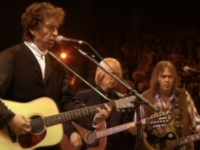There were certainly moments, and they seemed to come in bunches, when Neil Young stumbled so badly in the 1980s that it was difficult to imagine he’d ever regain his footing. But, not always.
It was a period of principled stands against the record-label intrusion of the day, and – alas – of unlistenably noble experiments. Still, if you dig deeply enough, you’re likely to discover something of value even on the occasionally intolerable techno-focused Trans.
Who’s got the time to endure all of that, though? That’s why we’re here, as Something Else! explores 1980s-era Neil Young That Aren’t Terrible.
By the way, we’ve left out the justifiably celebrated 1989 project Freedom, since by then Young was rounding back into shape. Yes, we’re gluttons for punishment …
“BOUND FOR GLORY” (OLD WAYS, 1985): Neil Young starts, it seems, where a train-load of other country songs might: With a solitary driver found tooling along the Trans-Canada Highway, eventually stopping to pick up a hitchhiker and her dog. From there, however, it becomes more intimate, more writerly – as far away from the genre’s typical reliance on narrative literalness and easy sentiment as that traveler is from his own wife and kids when the inevitable affair begins.
A figure no less than Waylon Jennings joins in for the middle two verses, sharing the mic on each chorus. The late fiddler Rufus Thibodeaux also adds an appropriately lonesome accompaniment, on a song that cops to fate … in all of its stunning, confusing, terrible, amazing glory.
“THIS OLD HOUSE,” with Crosby Stills Nash and Young (AMERICAN DREAM, 1988): A rare highlight – in fact, this and David Crosby’s “Compass,” might be the only ones – from a reunion that was 18 long years in the making. In the interim, CSNY had not only seemingly lost most of their creative momentum, but also the unerring ear for simple production values that guided 1970’s superlative Deja Vu.
Instead, much of American Dream is polished to the point of headache-inducing vertigo. Even within this darkly effective meditation on trying to survive through difficult economic times, those trademark CSNY vocals have been processed to the point where they sound plasticine. Focus, instead, of Young’s deceptively simple narrative, and those fascinatingly intertwined guitars.
“TWILIGHT” (THIS NOTE’S FOR YOU, 1988): The addition of a muscular horn section gives “Twilight” the late-night atmospherics of an old Blood Sweat and Tears song, prompting one of the decade’s most unguarded vocals from Young. There’s emotion here unhinted at one much of his most recent work at the time, much less the withering title track, which served as his spittle-flying indictment of the music industry – and the album’s lead single.
After a tortured statement of love-struck wonder, “Twilight” ends with a series of heart-stopping drum cadences, and these suitably ruminative guitar asides, like a confused lover having a series of revelations inside the creeping gloom. It’s a triumph of construction, and execution.
“HOLD ON TO YOUR LOVE” (TRANS, 1982): Forget, for a moment, the dippy Farfisa. We know. But try. Dig deeper, and there is this delicate Carl Wilson-esque melancholy in Neil Young’s approach with the lyric – something only underscored by the vocal interplay at the song’s end. A weeping pedal steel leads “Hold On to Your Love” toward its twilit conclusion.
Much of Trans, really, is like that: a terrific folk-based album, trying to find its way through a tangle of dated-sounding technology. If Young were to remake this note for note as an unplugged project, perhaps alongside one of those de rigeur throwback producers like T Bone Burnett or Joe Henry, it would suddenly be hailed as another in his seemingly never-ending Returns to Form.
“WHEN YOUR LONELY HEART BREAKS” (LIFE, 1987): A long-hoped-for reunion with Crazy Horse arrived with Young’s final album during his troubled stint with Geffen Records, their first project together since 1981’s typically earth-shattering Re*ac*tor.
That’s what they’re best known for, of course: Getting together in the service of melting amps. But “When Your Lonely Heart Breaks” shows a different side to these scraggle-haired garage rockers. On an album that’s elsewhere often focused on largely forgotten political issues of the day, this track – sparked by a ruminative turn on guitar from Poncho Sampedro – still packs an emotional wallop.
- The Bright Spots in George Harrison’s Troubled ‘Dark Horse’ Era - December 29, 2024
- The Pink Floyd Deep Cut That Perfectly Encapsulates ‘The Wall’ - November 29, 2024
- Why Pink Floyd’s ‘The Endless River’ Provided a Perfect Ending - November 11, 2024




Very good article. I have always thought Neil Young’s 1980s output was unfairly judged. Sure, there are some low points, but to these five high points above I would add the following five: “Opera Star” from Re-ac-tor, “My Boy” from Old Ways, “Hippie Dream” from Landing on Water, “Wonderin'” from Everybody’s Rockin’, and “Inca Queen” from Life. There is also a good compilation of the 80s era on a CD called Lucky Thirteen that is worth seeking out.
My Boy, Misfits from Old Ways
Like an Inca, Hold On To Your Love from Trans
all of Reactor
Coup De Ville from This Note’s For You
When Your Lonely Heart Breaks from Life
and I assume we’re not counting everything from Eldorado onwards as we all know that stuff ruled.
Yeah Hippie Dream and Hard Luck Stories are great, better at Trocadero 97 famous show.